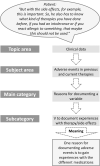Documenting Patient Data in Psoriasis Clinical Practice-Patient Focus Groups Supporting Psoriasis Experts' Decision-making
- PMID: 33727800
- PMCID: PMC7953889
- DOI: 10.2147/PPA.S297569
Documenting Patient Data in Psoriasis Clinical Practice-Patient Focus Groups Supporting Psoriasis Experts' Decision-making
Abstract
Background and objectives: This article presents patients' attitudes about documenting patient data and outcome measures in psoriasis clinical practice to support a Delphi approach of psoriasis experts to develop a standard data set.
Patients and methods: We conducted three focus groups with 14 patients in a German outpatient unit for psoriasis. The focus was to explore reasons for and against the documentation of single variables concerning personal, anamnesis, clinical, patient-reported outcomes, and other data.
Results: The patients mainly discussed if a variable has an impact on the disease or treatment decision, or if there might be a practical value from experiences with treatments when documented. In addition, in their point of view, patient-reported outcome data are important to document as it enables physicians to learn about a patient's subjective burden of disease. Patient education and the involvement of other physicians in the treatment process also emerged as relevant aspects.
Conclusion: The results help to understand patients' preferences on documenting patient data and their idea of an exhaustive doctor-patient consultation to improve doctor-patient communication, disease monitoring, and quality of care.
Keywords: documentation; focus groups; patient data; patient involvement; psoriasis.
© 2021 Otten and Augustin.
Conflict of interest statement
The authors declare no potential conflicts of interest with respect to the research, authorship, and/or publication of this article.
Figures
Similar articles
-
Documentation of psoriasis in routine care - expert consensus on a German data set.J Dtsch Dermatol Ges. 2021 Oct;19(10):1463-1475. doi: 10.1111/ddg.14547. Epub 2021 Oct 7. J Dtsch Dermatol Ges. 2021. PMID: 34622544
-
A qualitative systematic review of internal and external influences on shared decision-making in all health care settings.JBI Libr Syst Rev. 2012;10(58):4633-4646. doi: 10.11124/jbisrir-2012-432. JBI Libr Syst Rev. 2012. PMID: 27820528
-
Promoting and supporting self-management for adults living in the community with physical chronic illness: A systematic review of the effectiveness and meaningfulness of the patient-practitioner encounter.JBI Libr Syst Rev. 2009;7(13):492-582. doi: 10.11124/01938924-200907130-00001. JBI Libr Syst Rev. 2009. PMID: 27819974
-
A patient-centred approach to biological treatment decision making for psoriasis: an expert consensus.J Eur Acad Dermatol Venereol. 2015 Dec;29(12):2390-8. doi: 10.1111/jdv.13248. Epub 2015 Sep 14. J Eur Acad Dermatol Venereol. 2015. PMID: 26370908 Free PMC article. Review.
-
The importance of understanding patient and physician preferences for psoriasis treatment characteristics: a systematic review of discrete-choice experiments.Curr Med Res Opin. 2020 Aug;36(8):1257-1275. doi: 10.1080/03007995.2020.1776233. Epub 2020 Jul 1. Curr Med Res Opin. 2020. PMID: 32468865
Cited by
-
Development, Feasibility, and Acceptability of the Electronic Patient Benefit Index for Psoriasis in Clinical Practice: Mixed Methods Study.JMIR Dermatol. 2024 Aug 9;7:e54762. doi: 10.2196/54762. JMIR Dermatol. 2024. PMID: 39121470 Free PMC article.
References
-
- World Health Organization (WHO). Global report on psoriasis; 2016. Available from: https://apps.who.int/iris/bitstream/handle/10665/204417/9789241565189_en.... Accessed August22, 2019.
LinkOut - more resources
Full Text Sources
Other Literature Sources



